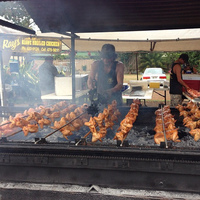Hecka-Huli-Huli Sauce
[an error occurred while processing this directive]Edit page New page Hide edit links
Marinade and Basting Sauce for chicken.
As far as this Haole was able to determine, “Huli” in Hawaiian means to turn or roll,“Huli Huli” means to turn over completely - like turning chicken on a grill or rotisserie. This is a slightly Thai version of the classic Hawaiian BBQ chicken grilling sauce.
Ingredients:
Two or Three chickens, quartered.
1/2 cup pureed Pineapple (fresh if possible) or Pineapple juice. (125 ml)
1/2 cup Ketchup (125 ml)
1/2 cup Soy Sauce, (Tamari, Japanese Shoyu or whatever soy sauce you have on hand) (125 ml)
1/2 cup Brown Sugar (90 ml)
1/4 cup Sweet Chili Sauce (65 ml)
(Vietnamese or Thai - usually states “Sauce for Chicken”)
3 Tablespoons Rice Cooking Wine (60 ml)
3 medium garlic cloves, finely minced
1 heaping teaspoon of fresh Ginger - finely minced (10 ml)
1 heaping teaspoon (8 ml) of a potent Asian Curry Powder or 2 tsps. if domestic (15 ml)
1/2 teaspoon ground Coriander (3 ml)
1/2 teaspoon dried Basil (3 ml)
Juice from 1/2 of a juicy Lime (15 ml)
Procedure:
Place the quartered chicken pieces in a large bowl or pot of salted cold water - about 2 Tablespoons (30 ml) per bird - and let stand while you put together your Huli Huli Sauce (soak for at least an hour, but keep cold. Add ice as needed, or refrigerate!)
Whisk together all ingredients. Remove the chicken from the brine and pour the marinade over the chicken pieces at least 4 hours before grilling (8 hours is better - marinating overnight is even better). “Huli Huli” the chicken pieces once in a while as they marinate, covered, in the refrigerator. (If you are just cooking one chicken, you can marinate the quarters in Ziplock bags) Remove the chicken from refrigerator about a 45 minutes before grilling to take the chill off.
Grill indirectly - turning occasionally - until the chicken is 150° F (65° C) at the center of the thickest part of the breast. This is the time to add some wood chips for a touch of smoke - some Mesquite chips sealed up in a doubled-up foil pouch with some small holes in it works for me. When you no longer see the Mesquite smoking, remove the foil pouch from the fire.
Then baste the chicken again with the marinade and move the chicken directly over the hot coals or hottest part of your grill and turn often - maybe even every 30 seconds - to prevent burning. Baste often with the remaining marinade. Continue to “Huli Huli” until the thigh meat can be pulled cleanly from the bone and the breast meat temp is at least 165°F (73°C). It may help to make up your own “Huli Huli” song to help pass the time.
Note: Baste just before you turn the chicken pieces and stop basting at least 5 minutes before you remove any chicken from the grill - remember, the marinade contains raw chicken juices and it needs to boiled for 5 minutes or so before using to baste the chicken. Also, always bend the chicken thigh joints back until the joint pops apart before you start to cook - really helps the joint to cook at the same rate as the rest of the meat.
To reduce the grilling time, you may pre-cook the chicken, in the marinade, and covered with foil, in the oven at 300° (150°C) for 45 minutes or so. (But that would be cheating).
Option 1: This recipe would obviously cook much faster if you substitute boneless, skinless chicken thighs. The boneless thighs, folded into a grill-warmed Pita with some chopped Romaine, fresh Basil leaves and perhaps some thinly sliced cucumber is a wonderful do-it-yourself grill-side meal.
Option 2: For a slightly easier to handle and perhaps a little more elegant dinner version, cut the boneless, skinless chicken thighs into strips or and thread unto thick and pre-soaked bamboo skewers and marinate for an hour in the Huli-Huli Sauce before grilling.
Onolicious!
Kiawe wood is what is commonly used for cooking Huli Huli Chicken - sometimes burned as hardwood charcoal and sometimes just added for smoke to a standard charcoal fire. It is an invasive species of Mesquite, which works as a decent substitute. Casuarina (known locally as Ironwood) is also sometimes used.


Comments
1 comment(s) on this page. Add your own comment below.
Here is that recipe you requested, it has more ingredients than Steve’s but it is worth it. Enjoy!
Leave a comment
Keep it clean!